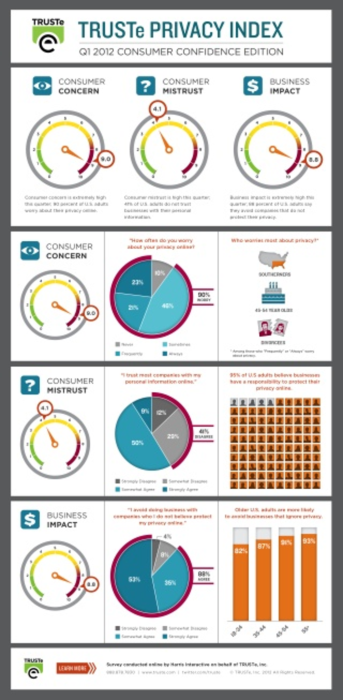Ninety percent of U.S. adults worry about online privacy, while 41% do not trust most companies with their personal data, according to a Feb. 13 survey from TRUSTe. The report, the Consumer Confidence Edition, is the first installment of a quarterly index from the privacy management company.
Of the 90% of consumers who worry about their online privacy, 23% report “always” worrying while 21% say they are “frequently” worried. Of the 41% that disagreed with the statement “I trust most companies with my personal information online,” 12% strongly disagreed.
“Finding that 41% of adults don’t trust businesses with their personal information seemed shockingly high, but the flip side of that is that if 90% are concerned about privacy, that means 60% of companies are trusted,” said Chris Babel, CEO of TRUSTe. “That to me is the glimmer of excitement and hope: businesses that focus on the issues around privacy and data security are trusted.”
The index broke down privacy concerns by demographics, revealing that those living in the south were most likely to worry always or frequently, and those aged 45 to 54 years old worried more than those in other age groups.
But while privacy concerns would seem more likely among more mature consumers, there was a fairly narrow difference between age groups. Asked whether they would avoid a business they felt did not believe in protecting their privacy, 82% of 18-to-34-year-olds agreed they would, making them the least concerned age group, while 93% of those surveyed who were ages 55 and older said they would avoid a business for that reason.
“It’s more equally balanced in the concerns across all demographics than I was expecting,” Babel said.
Babel stressed that marketers will want to follow the three guidelines of being transparent; giving choice and allowing consumers to decide whether to opt in to targeted advertising or not; and being accountable, following through with what the consumer requests.
“You can do all these things, but if you are not building trust in your brand around private information and what you’re doing with it, you’re wasting your dollars in the other buckets,” Babel said.








